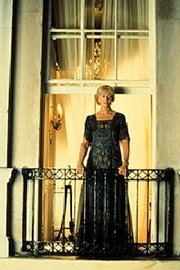Mrs. Dalloway
|
|

Mrs Dalloway (1925) is a novel by Virginia Woolf detailing one day in Clarissa Dalloway's life about post-World War I England.
The novel follows Clarissa Dalloway throughout a single day in post-Great War England in a stream of consciousness style narrative. Constructed out of two short stories that Woolf had previously written ("Mrs. Dalloway in Bond Street" and the unfinished "The Prime Minister") the basic story is that of Clarissa's preparations for a party she is to host that evening. Using the interior perspective of the novel, Woolf moves back and forth in time and in and out of the various characters' minds to construct a complete image, not of just Clarissa's life, but capturing the Edwardian social structure in the space of a single day.
Because of structural and stylistic similarities, Mrs. Dalloway is commonly thought to be a response to James Joyce's Ulysses, a text that is commonly hailed as the greatest novel of the Twentieth Century. Woolf herself derided Joyce's masterpiece, even though Hogarth Press, run by Virginia and her husband Leonard, initially published the novel in England. Fundamentally, however, Mrs. Dalloway treads new ground and seeks to portray a different aspect of the human experience than Ulysses. While there are certainly stylistic and structural similarities, most attempts to concretely link Mrs. Dalloway and Ulysses beyond superficial resemblance have fallen flat in the critical canon.
The novel itself is preoccupied with a number of issues. Foremost are certainly, feminism and madness, in the paired characters of Clarissa Dalloway and Septimus Warren Smith. As a commentary on Edwardian society, Clarissa's character highlights the role of women as the proverbial "Angel in the House" and embodies both sexual and economic repression. Septimus, as the shell-shocked war hero, operates as a pointed criticism of the treatment of insanity and depression. Woolf lashes out at the medical discourse through Septimus's decline and ultimate suicide. Similarities in Septimus's condition to Woolf's own struggles with manic depression (they both hallucinate that the birds sing in Greek, and Woolf once attempted to throw herself out a window as Septimus finally does) lead many to read a strongly auto-biographical aspect into Septimus's character. Ultimately, though, the novel serves as commentary on a wide array of issues from colonialism (in Peter Walsh), commercialism, and medicine to feminism, sexuality (Sally Seton), and politics.
Mrs. Dalloway is possibly Woolf's most well-known novel, owing in part to the recent popularization by Michael Cunningham's The Hours. "The Hours" was Virginia's working title for the novel, and Cunningham's novel is based in part on Mrs. Dalloway and on Woolf's own life. However, it must be recognized that while his novel and the subsequent film met with much financial and critical acclaim, it does not aim to be an authoritative account of Woolf's life or as literary criticism and should only be taken as what it is, a work of fiction.
A film version was made in 1997 by Dutch feminist film director Marleen Gorris. It was adapted from Woolf's novel by British actress Eileen Atkins and starred Vanessa Redgrave in the title role. The cast included Natascha McElhone, Rupert Graves, Michael Kitchen, Alan Cox, and Sarah Badel.zh:达洛维夫人
